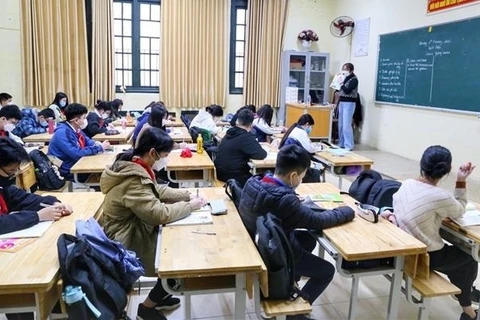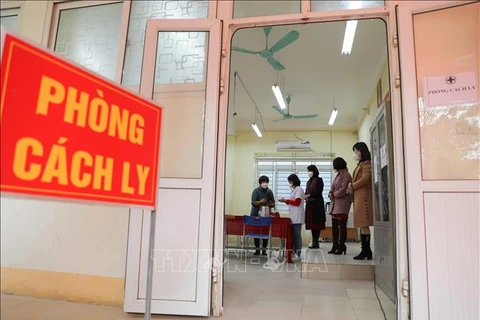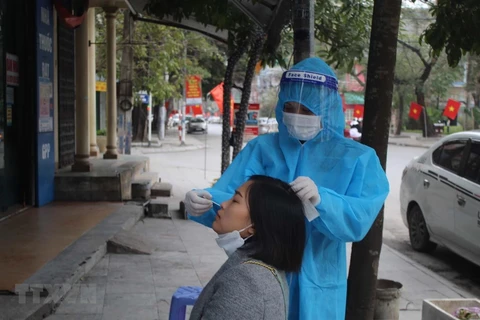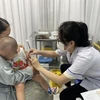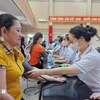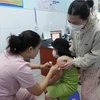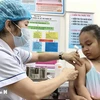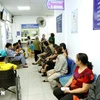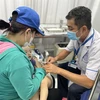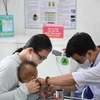 The COVID-19 pandemic is forecast to continue at least for the rest of the year. (Photo: VietnamPlus)
The COVID-19 pandemic is forecast to continue at least for the rest of the year. (Photo: VietnamPlus) Hanoi (VNA) – Since the first COVID-19 infections were reported on January 23, 2020, Vietnam has recorded 2,380,695 cases so far, ranking 34th among 225 countries and territories around the world. It stands at 145th place in terms of the ratio of infections to one million people – 24,111.
The fight against the COVID-19 pandemic is forecast to continue in the years to come. In Vietnam, the Ministry of Health (MoH) has warned about the risks of coronavirus transmission in many localities after the Lunar New Year (Tet) holiday.
COVID-19 pandemic unable to end before 2023
In a recent interview granted to the press, Minister of Health Nguyen Thanh Long cited the World Health Organisation (WHO) as predicting that the pandemic will not end before 2023. In Vietnam, pandemic prevention and control must still be given the top priority.
He said the entire health sector has to keep exerting efforts to carry out all anti-pandemic measures. The COVID-19 combat strategy will continue adhering to the spirit of the Government’s Resolution No. 128, which is safely and flexibly adapting to and effectively controlling the pandemic, with a focus on expanding the vaccination coverage, especially the third doses for people aged over 18, the primary doses for those aged 12 - 18, and preparations for inoculating children aged 5 - 11.
Under the Government and the Prime Minister’s directions, the MoH has conducted prudent, comprehensive, scientific and objective consideration of the inoculation for children aged 5 - 11. It is also pushing ahead with public health measures such as 5K (khau trang - wearing face masks; khu khuan - disinfection; khoang cach - keeping distance; khong tu tap - no gathering; and khai bao - making health declarations).
Of these, wearing face masks is one of the important solutions to virus transmission.
In particular, more attention must be paid to improving the healthcare system’s capacity, especially in dealing with severe cases, so as to enhance responsiveness to every health situation, according to the minister.
Vietnam must not relax control over Omicron variant
Long said the Omicron variant causes milder symptoms compared to those of the Delta variant but spreads up to seven times faster in unvaccinated people and three times faster in those vaccinated. Without proper control, the number of new cases will surge, leading to an increase in severe cases and fatalities.
Over the last two years, Vietnam has reaped highly encouraging outcomes in the combat against COVID-19, with the numbers of new infections, severe cases and fatalities declining. This is attributable to long-term efforts including vaccination, capacity building for the healthcare sector, experience in treatment, classification of patient reception, and early treatment in the community.
All of these factors have helped reduce the fatality rate, he noted.
However, he also urged stronger efforts in the time ahead as Omicron spreads very fast, adding the new variant may show milder symptoms compared to the Delta variant, but if many people contract Omicron at the same time, the number of severe patients will definitely increase and the healthcare system may still be overloaded.
The MoH has continuously issued warnings and called on authorities and people not to relax control over this variant but instead take strict measures, especially public health measures and the 5K principle, to curb the rise in new cases. A spike in infections would result in soaring severe cases and an overloaded healthcare system, which would subsequently lead to more deaths, Long went on.
The official said Vietnam has enjoyed positive outcomes in the fight against COVID-19, especially the large vaccination coverage that is one of the best in the world. Together with other measures, vaccination is one of the keys to helping life return back to normal.
The MoH has reported on the spring vaccination campaign to the Prime Minister and Government. It has also issued guidance on this issue to localities and the medical force.
All healthcare establishments have geared up sufficient medical supplies for treating patients, including COVID-19 ones so that all people can access medical services when they need them, the minister added./.



